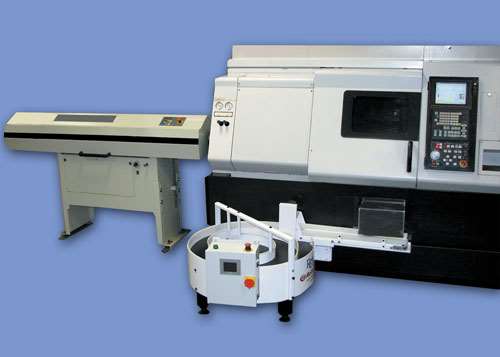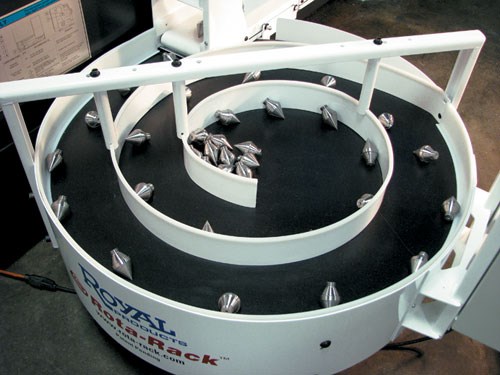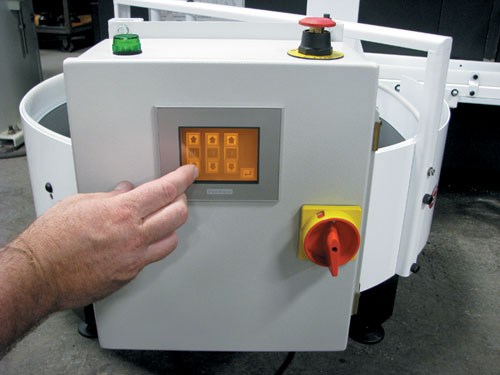Rotary Parts Accumulator
This rotary collection device allows safe parts accumulation from untended bar-fed lathes. It is programmed to index with each part produced, collecting parts without allowing them to collide with one another.
To take full advantage of untended machining, a shop needs to be sure its machines are equipped with the appropriate accessories that can keep the operation running smoothly for extended periods of time. These accessories pertain to each aspect of the operation, from material delivery (bar feeders) to actual cutting (tool monitoring and coolant delivery) to cleanliness and safety (mist collectors and fire suppressant systems). Equally important is systematic removal of the finished parts from the machine.
One such machine tool accessory that can be used for unloading parts during untended operations (or while machinists tend to more productive tasks) is the Rota-Rack rotary parts accumulator from Royal Products. This unit is designed to reduce the risk of part damage and keep parts in order for quality control purposes as they come off a CNC turning center.
Featured Content
Royal originally developed the unit for use in its own factory as a better way to manage the large volumes of live center and collet chuck components produced there. This new method of unloading parts worked better than messy, oil-filled tubs or wooden boxes that did not adequately protect the parts. Neither of those approaches accommodated enough parts to allow the machines to run untended for extended periods of time.
“Now our CNC lathes continue making parts long after our last employee leaves for the night or weekend,” says Tom Sheridan, director of marketing at Royal. The company quickly saw the opportunity to market its Rota-Rack to other companies that would be interested in earning additional profit by running a second or third shift with existing equipment and no additional employees.
One of the key benefits of the rotary parts accumulator is its ability to protect workpiece surface finishes. It is constructed of a welded steel turntable, with all contact surfaces covered with a high-lubricity UHMW (ultra-high molecular weight) plastic to minimize friction. It is important to note that when parts begin to accumulate in the center of the turntable, they will rub against each other. However, the motion is slow, smooth and intermittent, which results in minimal impact and damage.
For a machine to use the rotary parts accumulator, it must be set up with a means for getting the finished parts out of the spindle. On most lathes, this is accomplished with a parts catcher that transfers completed parts to some type of collection box. It may be necessary to perform a simple modification to the collection box by cutting out the bottom and side of the box so that parts can pass through to the conveyor. Some new machines can be ordered “conveyor-ready,” with this modification already in place.
The unit is designed for use with any CNC lathe that is equipped with a parts catcher. It can be mounted either to the left or right side of the machine tool (with the turntable rotating either direction), and it is height-adjustable from 11 to 50 inches. The 1-meter (3.28-foot) diameter turntable provides more than 850 square inches of usable surface area and has a payload capacity of 700 pounds. The standard configuration handles workpieces measuring as much as 10 inches long by 3 inches in diameter, and longer parts often can be accommodated with a modification of the spiral contour.
The touchscreen, solid-state PLC (programmable logic controller), which can be mounted in three different locations on the housing for optimum positioning, does not require a machine tool interface and takes about 20 seconds to program. The user simply enters the part cycle time and degree of turntable rotation for each part (based on part length). A counter can also be set to shut the unit down after a specified number of parts have been collected.
As a finished part comes out of the lathe, it drops onto the conveyor and is moved towards the rotating turntable. Each time a part comes out of the machine, the turntable indexes to the next position. As the turntable indexes, the parts are gently guided towards the center of the unit via the spiral. Accumulated parts can be removed from the center after several hours of unmanned production.
By providing a method for safely collecting large volumes of finished parts, the rotary parts accumulator can help manufacturers achieve significant improvements in both part quality and profitability.
RELATED CONTENT
-
Skiving Long, Slender Parts with Tight Tolerances
Here's a look at one of the oldest and most efficient methods of screw machine production for parts that are long and slender, with close-diameter tolerances and finishes, or parts that require truly spherical radii.
-
Tools and Technologies for Deep Hole Drilling
Understanding the challenges of deep hole drilling and knowing how to select and apply the appropriate tools will help a shop profit from this operation.
-
Making Micro Threads
Production of micro threads can be challenging, but using the most suitable tools for a given application can simplify the task.









